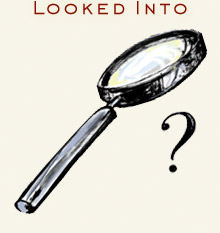Emdashes—Modern Times Between the Lines
The Basics:
About Emdashes | Email us
Ask the Librarians
Best of Emdashes: Hit Parade
A Web Comic: The Wavy Rule
Features & Columns:
Headline Shooter
On the Spot
Looked Into
Sempé Fi: Cover Art
How about let's Target some crappy magazines for having such crappy content, instead
Filed under: Looked Into

Lisa Williams writes in to direct our attention to this Romenesko snippet about the ASME's reaction to the Target controversy/non-controversy. Thanks, Lisa! She also notes that she backs up often, which I didn't mind at all because she preceded it with "Love the blog." That makes everything OK. The Philadelphia Inquirer mentioned the Target business in a recent story about single-issue sponsors and unorthodox ad design, too. (Admirably, the lede cites an example from the Inquirer itself.) And in the Boston Herald, David Carey speaks his mind:
"'We've had people who say the New Yorker shouldn't do things like this," Carey, The New Yorker's publisher, told the Herald in an interview. "I don't agree with them. We're a commercial business.''
My friend Heather, whose charming, articulate child I'm helping take care of in coastal Massachusetts this week, just strolled over to tell me that, speaking of sponsors, Jack White is writing a song for Coke. Indeed, he's seriously considering it:
“They want a new ‘I’d Like To Buy The World A Coke’ and believe Jack is the only artist who can deliver them something that will be equally timeless,†the source explained.
It’s seems unlikely that White or The White Stripes will perform or even appear in any new campaign, but with the band’s traditional and authentic approach and Coca Cola’s multinational status, a commercial could raise eyebrows amongst the group’s fanbase.
In 2001 the band declined the offer of appearing in a Gap commercial, hinting that doing so would mean selling out. "The Gap wanted us to be in a commercial and we said 'no' and everyone said, 'why not'? It's almost as if, if people are willing to give you that much money, you are insulting everyone you know by turning it down,†said White at the time. “People's opinions about selling out seem to have changed over the years."
Commodify your dissent from the commodification of dissent! I still don't care about the Target ads, not because I'm a slavish loyalist but because I think you'd have to be from Mars to confuse them with New Yorker content. The only real objection I had to them was that they made the ads, and hence the margins, of the magazine too visually consistent, bland even in their groovy garishness. What's charming about New Yorker ads is their smallness and oddness, the juxtaposition of improbable animal pins and lap pools and homey hats and retirement communities and missing forks and Galapagos nature expeditions and small-publisher books and cheery newcomer websites and other stuff, all in tiny typefaces with distinctive and elegant yet unobtrusive graphics. The Target ads may be heralding that all this, like multiple-artist spots, may be a thing of the magazine's past, but I think it would be a mistake to junk the old model altogether. Attracting larger advertisers is good, with some exceptions, but sameness of pages—even with different artists—is not The New Yorker, and I think they know that.



